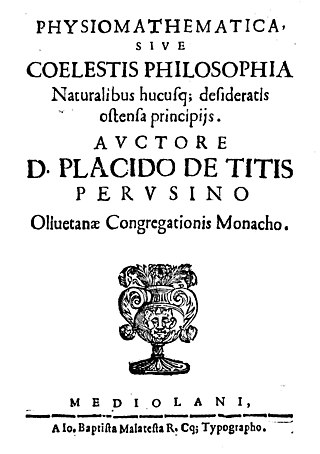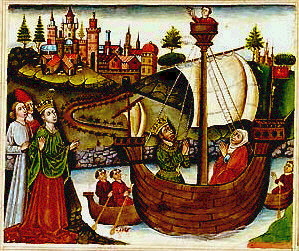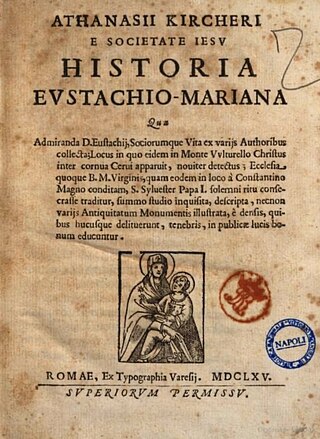Related Research Articles

Castalia, in ancient Greek and Roman literature, was the name of a spring near Delphi, sacred to the Muses; it is also known as the Castalian Spring. It is said to have derived its name from Castalia, a naiad-nymph, daughter of the river-god Achelous, who is said to have flung herself into the spring when pursued by the god Apollo.
Most horoscopic traditions of astrology systems divide the horoscope into a number of houses whose positions depend on time and location rather than on date. In Hindu astrological tradition these are known as Bhāvas. The houses of the horoscope represent different fields of experience wherein the energies of the signs and planets operate—described in terms of physical surroundings as well as personal life experiences.

Saint Eustace is revered as a Christian martyr. According to legend, he was martyred in AD 118, at the command of emperor Hadrian. Eustace was a pagan Roman general, who converted to Christianity after he had a vision of the cross while hunting. He lost all his wealth, was separated from his wife and sons, and went into exile in Egypt. Called back to lead the Roman army by emperor Trajan, Eustace was happily reunited with his family and restored to high social standing, but after the death of Trajan, he and his family were martyred under Hadrian for refusing to sacrifice to pagan Roman gods.
Ferroglobus is a genus of the Archaeoglobaceae.

Telesphore Placidus Toppo was an Indian prelate of the Catholic Church and a member of the aboriginal tribal community who was archbishop of the Archdiocese of Ranchi from 1985 to 2018, after serving as coadjutor there for a year. He was bishop of Dumka from 1978 to 1984. He was made a cardinal in 2003, the first from India's tribal population.

Nonantola is a town and comune in the province of Modena in the Emilia-Romagna region of northern Italy. It is in the Po Valley about 10 kilometres (6 mi) from Modena on the road to Ferrara.

Disentis Abbey is a Benedictine monastery in the Canton of Grisons in eastern Switzerland, around which the present town of Disentis grew up.

The Ottilien Congregation, often also known as the St. Ottilien Congregation and as the Missionary Benedictines, is a congregation of religious houses within the Benedictine Confederation, the aim of which is to combine the Benedictine way of life with activity in the mission field.

Placidus was a disciple of Benedict of Nursia. He was the son of the patrician Tertullus, was brought as a child to Benedict at Sublaqueum (Subiaco) and dedicated to God as provided for in chapter 69 of the Rule of St. Benedict (oblate).

Saint Placidus (Placitus), along with Saints Eutychius (Euticius), Victorinus and their sister Flavia, Donatus, Firmatus the deacon, Faustus, and thirty others, have been venerated as Christian martyrs. They were said to be martyred either by pirates at Messina or under the Emperor Diocletian.

Otto Truchsess von Waldburg was Prince-Bishop of Augsburg from 1543 until his death and a Cardinal of the Catholic Church.

Flavius Felix, sometimes erroneously called Constantius Felix, was a general of the Western Roman Empire, who reached the prominent rank of patrician before being killed probably by order of Aetius. For his consulate in 428 he issued some consular diptychs, one of which has been preserved until modern times.

The praetorian prefecture of Italy was one of four praetorian prefectures into which the Late Roman Empire was divided. It comprised the Italian peninsula, the western Balkans, the Danubian provinces and parts of North Africa. The Prefecture's seat moved from Rome to Milan and finally, Ravenna.
Vulcacius Rufinus was a Roman politician, related to the Constantinian dynasty.

Placidus de Titis was an Olivetan monk and professor of mathematics, physics and astronomy at the University of Pavia from 1657 until his death. Placidus popularized the system of astrological houses now known as the "Placidian system", current in modern astrology. He did not invent the method; it is acknowledged by the 12th century Hebrew astrologer Abraham Ibn Ezra as the system employed by Ptolemy, an attribution that was accepted by Placidus.

The Book of the Knight Zifar is the earliest fictional adventure tale in prose in the Spanish language. It was written around 1300, probably by a cleric of Toledo, Ferrand Martínez, who is mentioned in the prologue. The book has much affinity with contemporary works of chivalric romance.
Lactantius Placidus was the presumed author of a commentary on Statius's poem Thebaid. Wilhelm Siegmund Teuffel considered him to be the same person as Luctatius Placidus, the ostensible author of a medieval Latin glossary titled Glossae Luctatii Placidi grammatici. Some authors also attribute an anonymous work titled Narrationes fabularum quae in Ov. Metam. occurrunt to Lactantius, though Franz Bretzigheimer argued against this view, on the basis that the commentator on Statius lacks evidence of Christian attitudes seen in the Narrationes.
Imperium: Pompeii is a 2007 Italian television film and part of the Imperium series. It tells the story of the last days of Pompeii, the city buried by the eruption of Vesuvius in 79 AD. It was shot in the Empire Studios in Hammamet, Tunisia. Mass scenes involved about 3,200 extras. Anthony LaMolinara supervised the special effects of the film.

Historia Eustachio Mariana is a 1665 work by the Jesuit scholar Athanasius Kircher. It describes his chance discovery of a ruined shrine of the Virgin Mary at Mentorella, the site where tradition held that the Roman martyr Saint Eustace had experienced conversion to Christianity. The book was dedicated to Giovanni Nicola, abbot of the monastery at Vulturalla, and a member of the family of the counts of Poli. It was intended to help raise funds for the restoration of the chapel, and it was Kircher's first topographical work.
In Greek mythology Nyctaea is a princess featuring in two stories about father-daughter incest, who is eventually turned into an owl by the goddess Athena. Both her tales are preserved in the works of pseudo-Lactantius Placidus, a Latin grammarian of the third century AD.